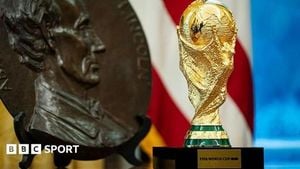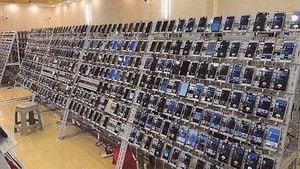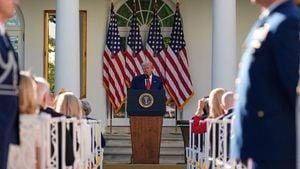Three major land purchases in New Hampshire by Chinese companies and investors have sparked a heated debate among state officials, business leaders, and local residents. The deals, which unfolded over the past decade, have drawn particular scrutiny in 2025 as concerns mount over their proximity to sensitive military installations and the broader implications for national security and economic policy.
The most recent and high-profile acquisition came in January 2025, when Nongfu Spring, China’s largest beverage company, bought a property near Nashua’s Pennichuck water system for a staggering $67 million—four times its assessed value. According to Newsweek, the land is located at 80 Northwest Blvd., near Nashua Airport, several defense centers, and a Federal Aviation Administration control center. Notably, it sits just eight miles from BAE Systems Electronic Systems, a major defense contractor, and eleven miles from the New Boston Space Force Station.
This purchase joins two others in the state involving Chinese investors: the 2017 acquisition of the former Daniel Webster College campus by Sui Liu for $11.6 million, and the 2015 purchase of Chester College of New England by the private Jiahui Education Group for just over $1.5 million. The Daniel Webster campus, a former aviation school, has since been partly repurposed by Southern New Hampshire University for its aviation program, as well as by Rotor, an unmanned aerial vehicle technology firm, and the Northern Cyclones Academy, a youth hockey program. Meanwhile, Jiahui Education Group’s Chester College purchase led to the creation of Busche Academy, a summer language school for international children, many of whom come from China to learn English, as reported by The Public’s Radio.
Republican Congress hopeful Lily Tang Williams, who fled communist China in 1988, voiced strong concerns about the intentions behind these acquisitions. “China doesn’t want to get into hard war, they don’t want to fire a shot, but they are using these so-called acceptable international expansion strategies to get the world on their side,” Williams told Newsweek. “But they have their own ambition and plan; it’s not to be our friend. They want to be the number one, dominate global power by 2049.” She further argued that such purchases could serve as a “Trojan horse,” allowing Chinese firms to slowly build influence by forging long-term relationships with businesses, elected officials, and educational institutions.
Senator Kevin Avard, a Republican from Nashua, echoed these concerns. “These purchases near our defense contractors, like BAE, and military installations, such as the New Boston Space Force base, threaten the safety of our state and the security of our nation,” Avard told Newsweek. He added, “There is cause for concern with all the recent Chinese purchases and activity in New Hampshire. Our land should not be sold to adversaries of the United States—we cannot have confidential intelligence compromised due to one of these land purchases being approved.”
These worries have not gone unheeded by state lawmakers. In March 2025, just two months after the Nongfu Spring sale, the New Hampshire Senate passed a bill restricting the sale of property on or around certain military installations to foreign principals from countries of concern, including China, Russia, Iran, Syria, and North Korea. “This law protects us from these instances from happening in the future,” Avard said. “However, we must deal with the consequences of transactions that have already happened.”
At the local level, Nashua Mayor James W. Donchess addressed the controversy during a City Hall meeting on August 12, 2025, where he noted the unusually large turnout. “This company came to Nashua as part of a state economic development initiative. Now let me repeat that: They were brought here by the State of New Hampshire Division of Economic Development,” Donchess said. “This Chinese company was looking for a location in the United States, it came down to two different competitive locations—one was in Maryland, the other here—and in the end they chose New Hampshire, Nashua.” He emphasized that the city supports state economic development efforts and that the goal was to create 200 jobs for the region.
Donchess also sought to quash rumors that Nongfu Spring intended to buy the Pennichuck water system itself. “We couldn’t sell the water company without state approval...we cannot take any kind of a step like that, ever, even if it had been suggested or proposed, without state approval,” he stated. “And I can tell you that, were it proposed, there’s not a single alderman in this chamber that would vote for that.”
Pennichuck Water CEO John Boisvert reinforced this message in an interview with Newsweek: “We’re the public water utility. It’s not for sale, it’s never been for sale, we’re not giving up any water rights.” He clarified that Nongfu Spring would simply be a regular customer, receiving water from Pennichuck Water Works like any other business in the service area. “Our involvement is regulated by law and we have to serve anybody within our service area,” Boisvert said. “We’re required to provide them service.”
In response to the growing scrutiny, New Hampshire Governor Kelly Ayotte directed the Department of Justice on August 15, 2025, to investigate the circumstances surrounding the Nongfu Spring purchase. The probe aims to assess any involvement by state and local officials and identify ways to improve oversight of such transactions in the future. Governor Ayotte told the New Hampshire Journal, “We’re always concerned when the Communist Party, the Chinese Communist Party, or anyone associated with that party buys land in New Hampshire.”
For their part, Chinese officials have pushed back against the criticism. Liu Pengyu, spokesperson for the Chinese Embassy, told Newsweek, “In essence, China-U.S. economic and trade ties are mutually beneficial and win-win. For years, investment by Chinese companies in the U.S. has made important contributions to U.S. jobs and economic growth.” He continued, “We hope the U.S. can stop inflating ‘security’ concerns, stop hyping the so-called ‘China threat,’ and stop smearing and obstructing normal China-U.S. economic and trade cooperation, and provide an open, fair, just, and non-discriminatory business environment for Chinese enterprises operating in the U.S.”
As the debate intensifies, the fate of these properties—and the policies governing future foreign investments—remains uncertain. What is clear is that New Hampshire’s experience has become a flashpoint in the broader conversation about balancing economic opportunity with national security, a challenge likely to persist as global rivalries continue to shape local realities.



